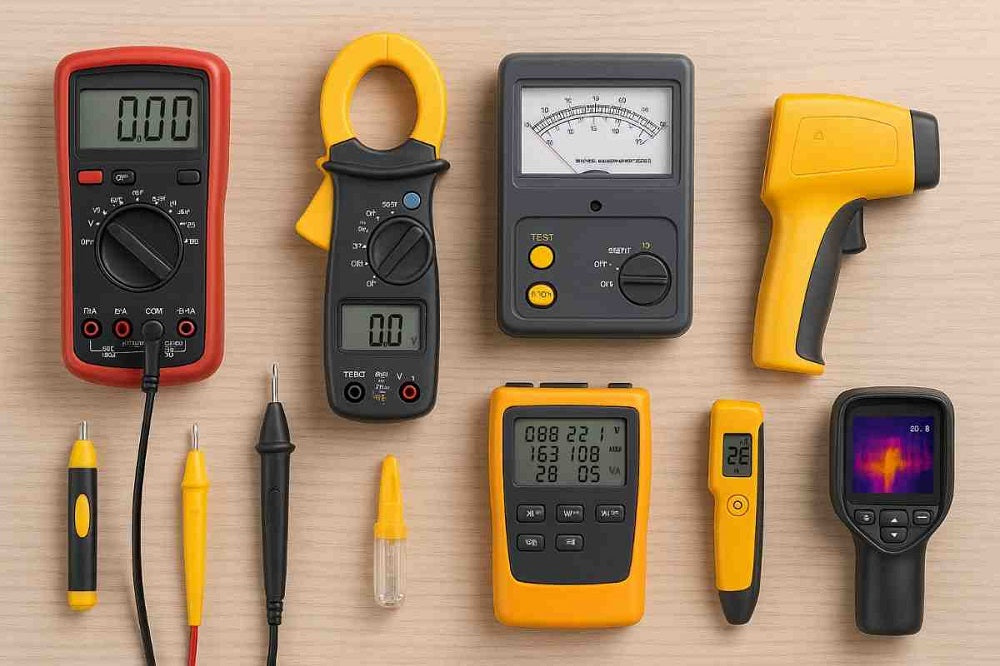
10 Essential Electrical Testing Instruments for Professionals
Introduction
In the world of electrical work, precision and safety are non-negotiable. Whether you’re an electrician, electrical engineer, or maintenance technician, having the right electrical testing instruments in your toolkit is the difference between a job done right and a costly mistake.
From troubleshooting wiring faults to ensuring compliance with safety standards, professional-grade electrical tools help you diagnose problems accurately, work efficiently, and most importantly, protect yourself from potential hazards.
In this guide, we’ll explore 10 essential electrical testing instruments every professional should own their functions, benefits, and expert tips for selecting the best ones.
1. Digital Multimeter (DMM)
A digital multimeter is the cornerstone of any electrical toolkit.
It’s a versatile instrument that measures:
➔ Voltage (AC/DC)
➔ Current (AC/DC)
➔ Resistance
➔ Continuity
Why Professionals Need It:
A DMM is the first tool you’ll reach for when diagnosing electrical issues. Whether you’re checking a faulty outlet, verifying a power supply, or testing a circuit, a multimeter is indispensable.
Pro Tip:
Choose a True RMS digital multimeter for accurate readings on both linear and non-linear loads. Models with auto-ranging capabilities save time and reduce errors.
2. Clamp Meter
A clamp meter measures current without the need to physically disconnect a circuit a huge time saver for high-current applications.
It works by detecting the magnetic field generated by current flow through a conductor.
Why It’s Essential:
➔ Non-intrusive measurement
➔ Ideal for checking current in large cables or live systems
➔ Safer than traditional ammeters
Pro Tip:
Opt for a clamp meter that can also measure voltage, resistance, and frequency for maximum versatility.
3. Insulation Resistance Tester (Megger)
An insulation resistance tester, often called a Megger, checks the quality of insulation in wires, motors, and electrical installations.
It applies a high DC voltage to measure insulation resistance in megaohms (MΩ).
Importance:
➔ Identifies deterioration in insulation before failure occurs
➔ Prevents short circuits and electrical leaks
➔ Essential for motor maintenance and compliance testing
Pro Tip:
Select a tester with multiple voltage ranges to suit different applications, from low-voltage wiring to high-voltage equipment.
4. Earth Ground Tester
Proper grounding is crucial for electrical safety. An earth ground tester measures the resistance of your grounding system to ensure it can safely dissipate fault currents.
Why Important:
➔ Protects people and equipment from electric shocks
➔ Required for compliance with safety standards such as IEEE and IEC
➔ Useful for testing grounding in industrial, commercial, and residential settings
Pro Tip:
Clamp-on ground testers are convenient for quick checks without disconnecting the grounding system.
5. Voltage Tester / Detector
A voltage tester or voltage detector quickly checks if a wire, socket, or panel is live.
Non-contact models are especially popular for their safety and ease of use.
Benefit:
➔ Fast, simple, and safe
➔ No need to open circuits or touch live wires
➔ Great for pre-work safety checks
Pro Tip:
Look for a dual-range voltage tester that can detect both low and high voltages accurately.
6. Continuity Tester
A continuity tester is a simple yet powerful tool that checks if an electrical path is complete.
It’s often used in wiring installations, appliance repair, and automotive electrical work.
Use Case:
➔ Identifies broken wires or poor connections
➔ Useful for confirming wiring correctness after installation
Pro Tip:
Choose a continuity tester with a loud audible signal and bright indicator light helpful in noisy environments.
7. Oscilloscope
An oscilloscope allows professionals to visualize electrical signals over time, displaying them as waveforms on a screen.
Importance:
➔ Essential for diagnosing complex electronic systems
➔ Detects signal irregularities, voltage fluctuations, and noise
➔ Used in both repair work and design testing
Pro Tip:
Digital storage oscilloscopes (DSO) provide better accuracy, advanced analysis functions, and the ability to save test data.
8. Power Quality Analyzer
A power quality analyzer measures various electrical parameters including:
➔ Voltage and current
➔ Frequency
➔ Harmonics
➔ Power factor
Why Professionals Need It:
Poor power quality can cause overheating, equipment malfunction, and energy inefficiency. This tool is critical for identifying and resolving these issues.
Pro Tip:
Portable power quality analyzers are ideal for on-site troubleshooting and energy audits.
9. Infrared (IR) Thermometer / Thermal Imager
Electrical faults often cause overheating before they result in visible damage.
An IR thermometer or thermal imager detects heat patterns without contact.
Benefit:
➔ Identifies loose connections, overloaded circuits, or failing components
➔ Improves preventive maintenance efficiency
➔ Reduces downtime by catching issues early
Pro Tip:
While IR thermometers give spot readings, thermal imagers provide a complete heat map, making them more effective for complex systems.
10. Cable Fault Locator
Although not always on a beginner’s list, a cable fault locator is invaluable for professionals working with underground or long cable runs.
It identifies the exact location of faults such as breaks or shorts.
Importance:
➔ Saves time in pinpointing issues
➔ Reduces the need for unnecessary excavation or dismantling
Pro Tip:
Choose one with both Time Domain Reflectometry (TDR) and acoustic fault-finding capabilities for maximum flexibility.
Conclusion
Electrical testing instruments are the backbone of professional electrical work. From the everyday digital multimeter to advanced tools like the power quality analyzer, each instrument plays a critical role in ensuring accuracy, safety, and efficiency.
Investing in high-quality testing tools not only improves your work quality but also reduces risks and extends the lifespan of electrical systems. Whether you’re an experienced technician or a newly certified electrician, building your toolkit with these 10 essential electrical testing instruments will help you work smarter, faster, and safer.

